VMware is pleased to announce the availability of VMware Telco Cloud Service Assurance release 2.1. This latest version of VMware Telco Cloud Service Assurance— released on January 19, 2023—brings together key feature upgrades and new capabilities.
VMware Telco Cloud Service Assurance is a real-time automated service assurance solution that blends the monitoring and management of complex 5G virtual and physical infrastructure and services end to end, from mobile core to transport to RAN. From a single pane of glass, VMware Telco Cloud Service Assurance provides a topology view of the complete infrastructure along with cross-domain, multi-layer, automated assurance in a multi-vendor and multi-cloud environment. It provides monitoring and network management across all layers for rapid insights, reduced costs, and improved customer experience. VMware Telco Cloud Service Assurance simplifies data- extraction, enrichment, and analysis of network data across a multi-vendor environment into actionable notifications and alerts. It manages the expanding business needs of Telco in a Software Defined Networking environment.
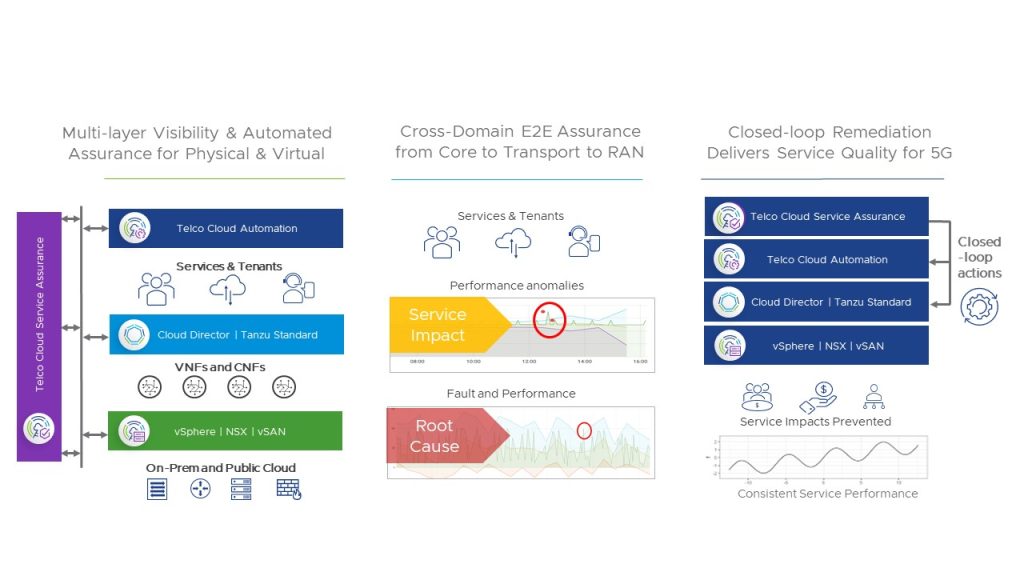
VMware vRealize Operations a purpose-built management solution monitors the VIM and CaaS infrastructure. In short, vRealize Operations is focused on IT Enterprise use cases providing monitoring for VIM / CaaS monitoring and public cloud monitoring. The key users are virtual network or cloud operation / engineering team. VMware TelcoCloud Service Assurance 2.1 leverages VMware vRealize Operations to build a complete end-to-end topology map that includes the virtual infrastructure (from vRealize Operations), physical infrastructure (gathered from built-in collectors), RAN fault and performance metrics (from Kafka collectors), and L2/L3 networking assurance capabilities. VMware Telco Cloud Service Assurance’s root cause and service impact analysis capabilities provide fast problem resolution by automatically correlating symptoms from the many layers of the infrastructure stack and pinpointing the problem’s root cause and service impact.
VMware Telco Cloud Service Assurance complements VMware vRealize Operations as a monitoring tool to gather insights regarding TCP RAN, Core Virtual and CaaS infrastructure to detect any faults or performance degradations. These insights detected by VMware vRealize Operations are sent as alerts to VMware Telco Cloud Service Assurance to do the higher-level end-to-end assurance and root cause analysis. The next step is to identify how fault or performance degradations are impacting the specific Telco RAN and core services that are hosted by CNF or VNFs. This is done by providing a multi-layer monitoring mechanism from physical, virtual, network functions and services and then correlating events to the underlying infrastructure, identifying root cause and resolving the issues. The key users for VMware Telco Cloud Service Assurance are Network Operations Center (NOC) and Service Operations Center
(SOC) teams who are responsible for resolving alarms/issues, network performance and availability, meeting SLA and service quality.
Telco Cloud Service Assurance – Cloud native architecture:
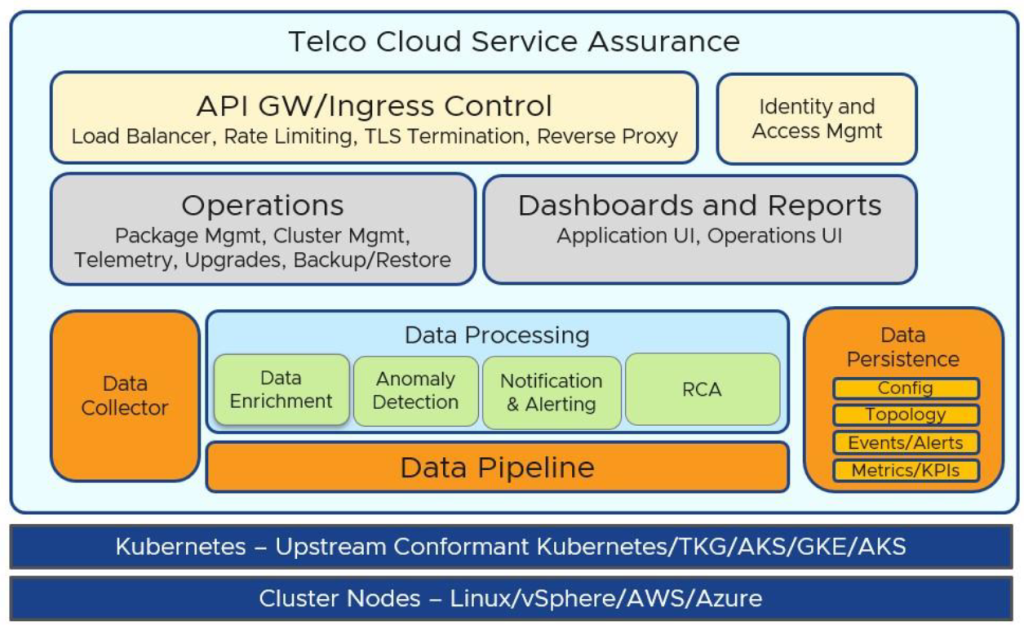
VMware Telco Cloud Service Assurance is built on a solid foundation of cloud native platform providing various functionalities (as shown in the above diagram) as micro services (data collectors, data processing, data persistence, dashboards, reports, RCA, API, IAM) as single-function module with well-defined interfaces and operations deployable on Kubernetes platform delivering various infrastructure assurance use cases.
Telco Cloud Service Assurance 2.1 also marks the release where current existing VMware Smart Assurance customers will be able to take advantage of Telco Cloud Service Assurance features such as closed loop remediation, open data collection framework, enrichment, alarming and thresholding, anomaly detection, ad-hoc reporting, cloud native scalable platform and new TMF APIs by exporting data from their current environment to newly deployed 2.1 environment. See below new features/new capabilities section on the interoperability support of Telco Cloud Service Assurance with VMware Smart Assurance deployments.
New Features, New Capabilities
Closed Loop Remediation and Assurance
Administrators are at increased pressure to meet SLA and service quality expectations in real time to keep the networks performing at optimum levels. With the need to remediate the failures quickly in a complex infrastructure, VMware Telco Cloud Service Assurance provides a remediation policy framework that automates the processes and procedures for common NOC faults that can be handled without human involvement. Administrators can define policies to allow automatic remediation actions when infrastructure faults occur that affect service. Different automated remediation actions can be taken based upon the duration of the problem. The framework also manages the remediation process by providing alerts and notifications, and dispatch for repairs.
Business impact analysis results then drive closed-loop remediation through integration with resource, service and lifecycle management orchestrators that are based on SOL API standards, such as VMware Telco Cloud Automation. VMware Telco Cloud Service Assurance drives closed-loop actions for infrastructure lifecycle management by making recommendations to orchestrators based on identified root cause issues, such as a need to allocate more vCPUs on a specific video to handle increasing traffic.
VMware Telco Cloud Service Assurance combines automated discovery and topology mapping across physical, virtual and container environments to provide complete visibility, along with cross-domain root cause analysis and service impact determinations to understand the impact of failures on services and customers. Through automated closed-loop actions, 5G service quality is maintained and delivered
consistently.
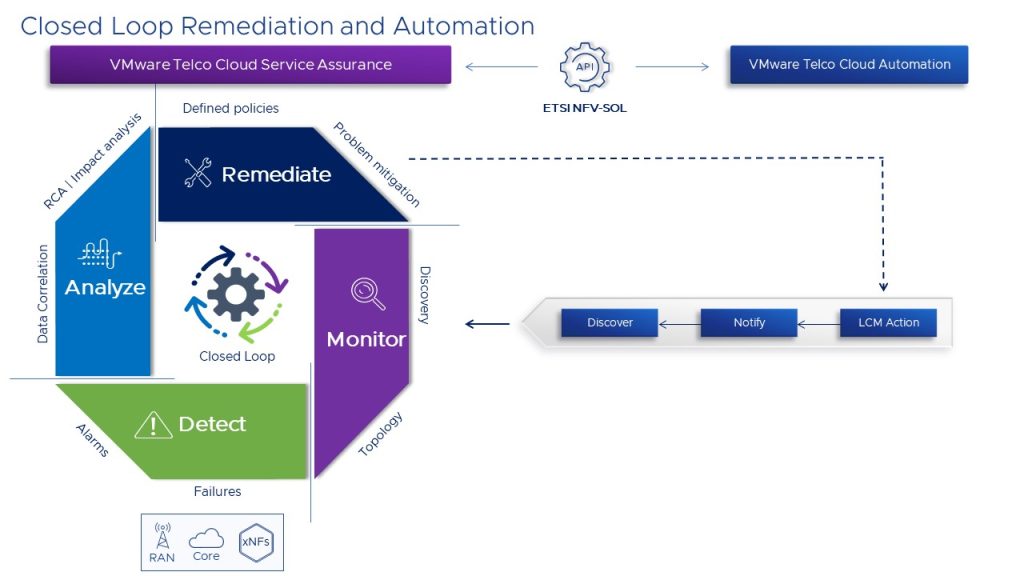
For more information on how it works check out the blog on Closed Loop Remediation in 5G Use Cases.
Unified Data Collector SDK
This release opens the current data collector framework in Telco Cloud Service
Assurance to customers to develop their custom data collectors to on-board 3rd party
data sources using data collector software development kit (SDK). The SDK introduces
programmable Python based framework focused on on-boarding data for fault,
performance monitoring and assurance use cases based on various protocols such as
REST, Kafka, SNMP, and so on. The collector SDK includes pre-packaged tools to
validate the collector developed and tested to assist the collector development.

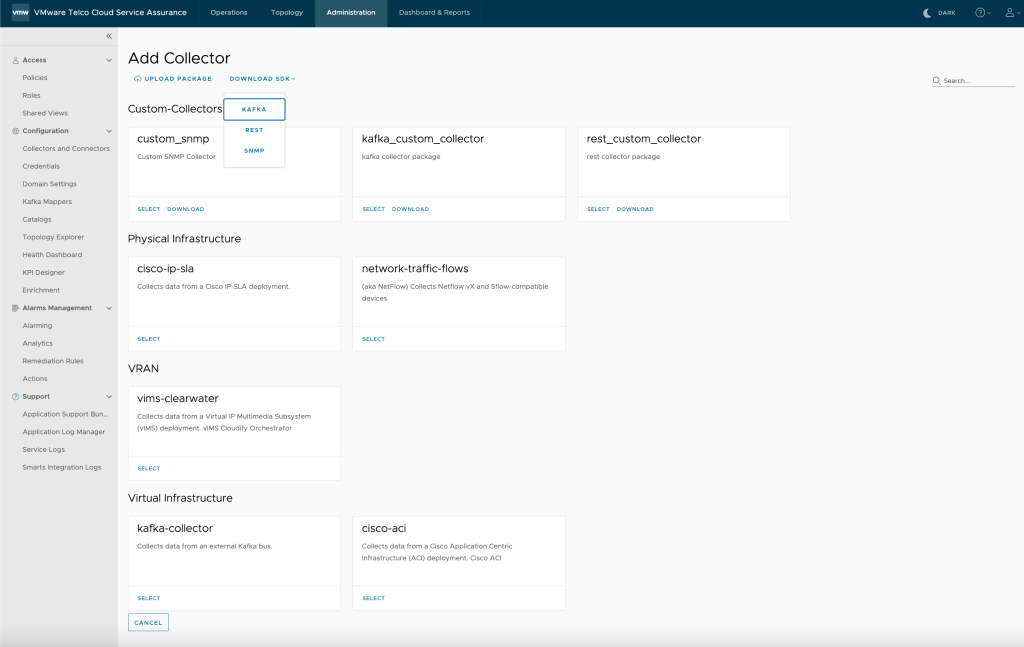

Pipeline Reporting
Telco Operators as part of Day 0 deployment and configuration of numerous vRAN sites leverage VMware Telco Cloud Automation as an Orchestrator.
The orchestration process involves deploying and configuring various layers of Telco Cloud Platform -RAN infrastructure (DU, Node Pool, Pods, VMs, vCenter, Hypervisor etc.) on top of bare-metal servers. At each stage of deployment, Telco Cloud Automation does validation checks using scripts to make sure the configuration and infrastructure health are SUCCESS before moving forward to next stage of deployment.
Here are some validation checks done at various stages
• Pre-Validation – bare metal server checks
• Stage1 – vCenter attachment checks
• Stage2 – NodePool Creation checks
• Stage 3 – DU instantiation checks
At each stage of deployment, NoC Operations Team would like to get visibility of the validation check results to be shown in NoC operations dashboard and reports tounderstand the status of deployment (Success/Failure). If there are any failures, NoC Operations Team would like to immediately troubleshoot the reason of failure in the dashboard (e.g. check error codes). Post deployment, operators would like to also view active status of deployed E2E vRAN infrastructure (Physical, Virtual, CaaS, CNF and Network) by connecting to various EMS/NMS systems, Ops Tools (e.g vRealize Operations , Datadog) deployed to monitor vRAN infrastructure.
The goal of this feature Pipeline Reporting is to enable Telco Operators to provide seamless experience under a single pane of glass for NoC right from day0, day1 deployment and configuration stage to day 2 operations stages of their environment.
To achieve the above goals, following VMware Telco Cloud Service Assurance (TCSA) features are available in 2.1 release:
• Ability for TCSA to actively pull and map Telco Cloud Automation Pod Cluster deployment validation results for reporting in TCSA
• Show Summary Dashboard by Market, Sites of validation results by stages
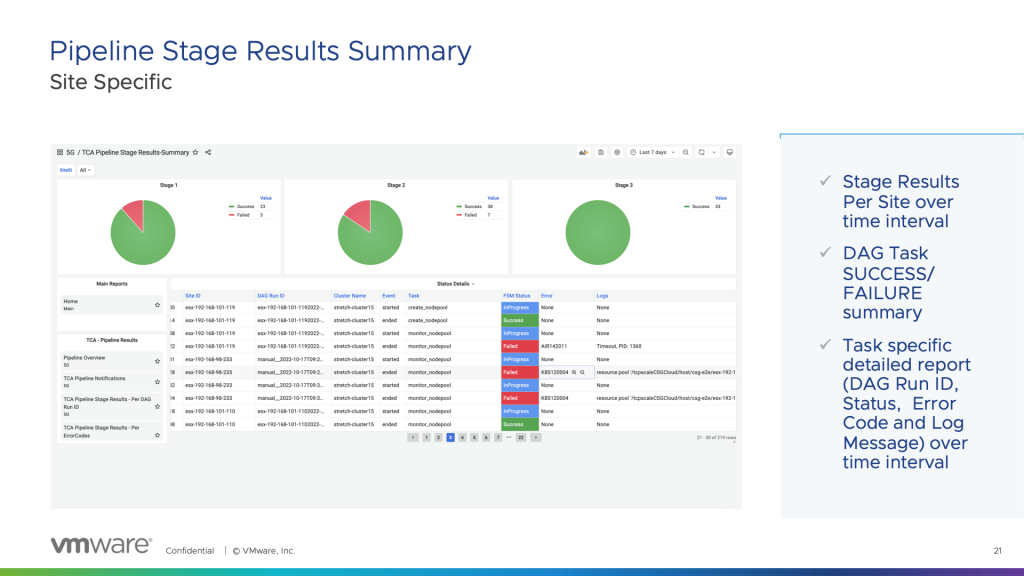
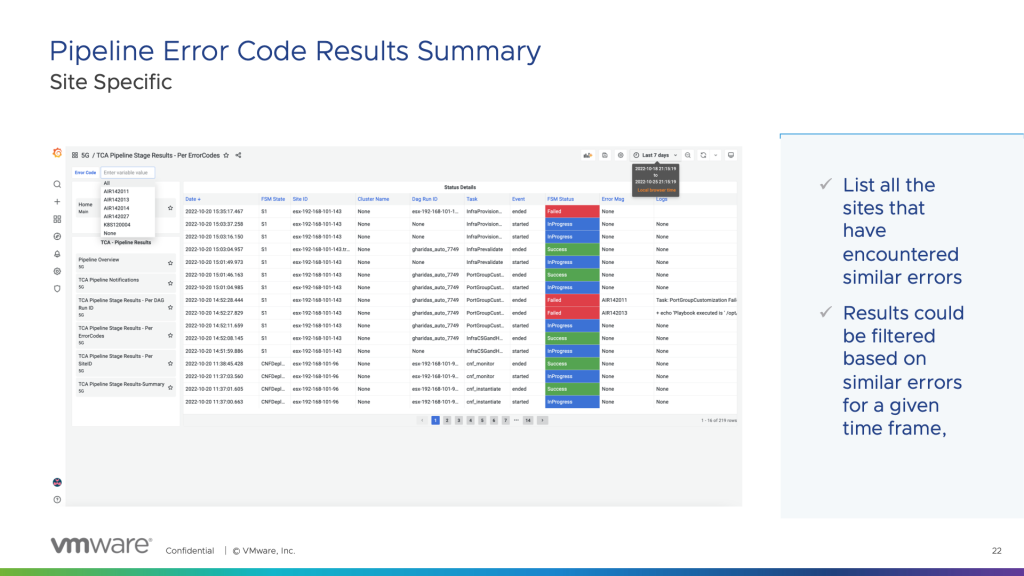
• Show Summary Dashboard and detailed reports by Markets/AOI/Server Type of validation results by stages

• Capability for users to create their own custom dashboard and reports based on common Telco Cloud Service Assurance staging pipeline data model.
• Visualize dashboards and reports of validation results providing a date range
• Provide contextual link from pre-validation reports to real active status (UP/DOWN) of the deployed infrastructure (Host, Hypervisor, Pod and connected network if discovered)
• Provide contextual link to Telco Cloud Service Assurance topology map and topology explorer
• Ability for Telco Cloud Service Assurance to actively pull and map DU CNF validation results for reporting in TCSA
• Provide visibility to Active NodePool status from Telco Cloud Automation to move next stage of deployment
Network Slicing Assurance
Network Slicing Assurance is now a GA release integrating with VMware Telco Cloud Automation to provide monitoring and assurance of Network Slices
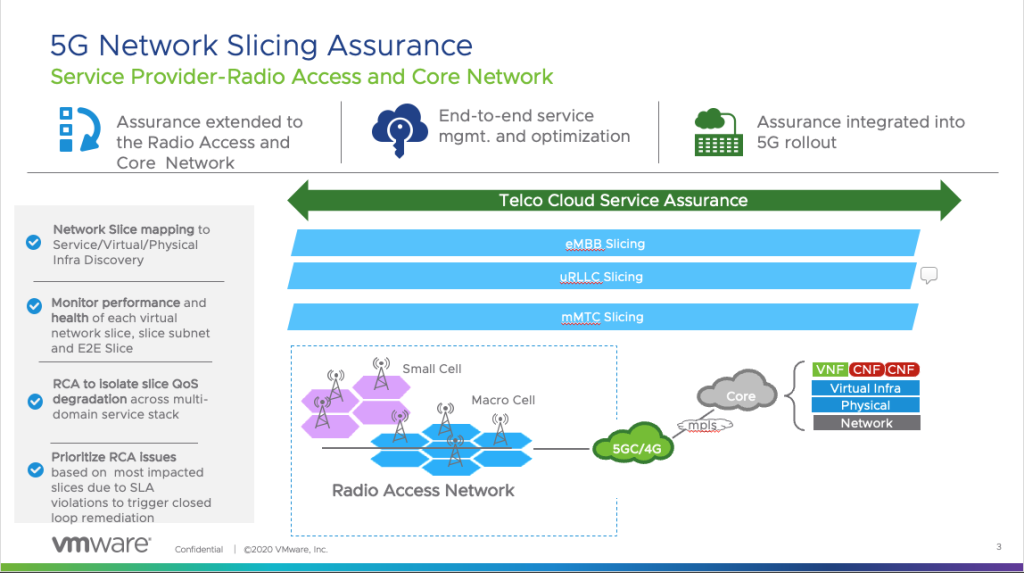
Following features are available in Telco Cloud Service Assurance 2.1 release as part of Network Slicing Assurance:
Network Slice Discovery: Ability to onboard network slicing catalogue, infrastructure templates and slice profile requirements into Telco Cloud Service Assurance with Telco Cloud Automation using standard APIs for discovery and monitoring. As part of on- boarding, Telco Cloud Service Assurance will provide visibility between Network Slice Instance, Network Slice Subnet Instance, hosted Virtual Infra to Customers configurations enabled over the RAN and Core infrastructure.
Network Slice Monitoring: Network slices span Radio, Mobile Core networks delivered over physical and virtual infrastructure and underlay transports such as IP/MPLS. Telco Cloud Service Assurance will monitor and analyze faults and health of virtual network slices.
RCA and Service Impact: Symptom and signature-based root-cause analysis to isolate network degradations across a multi-domain service delivery stack – RAN infrastructure, network slice, service, virtual, physical device, WAN transports proactively pinpoints root cause.
Automation: Trigger based on RCA closed-loop remediation actions to Telco Cloud Orchestrator, or any other SOL API based orchestrators using standard APIs to proactively optimize the Network Slice.
Geo Map Connectivity Views
The 2.1 release of VMware Telco Cloud Service Assurance introduces new type of Map views called Geo Map Connectivity Views to represent infrastructure connectivity in geo graphical views.
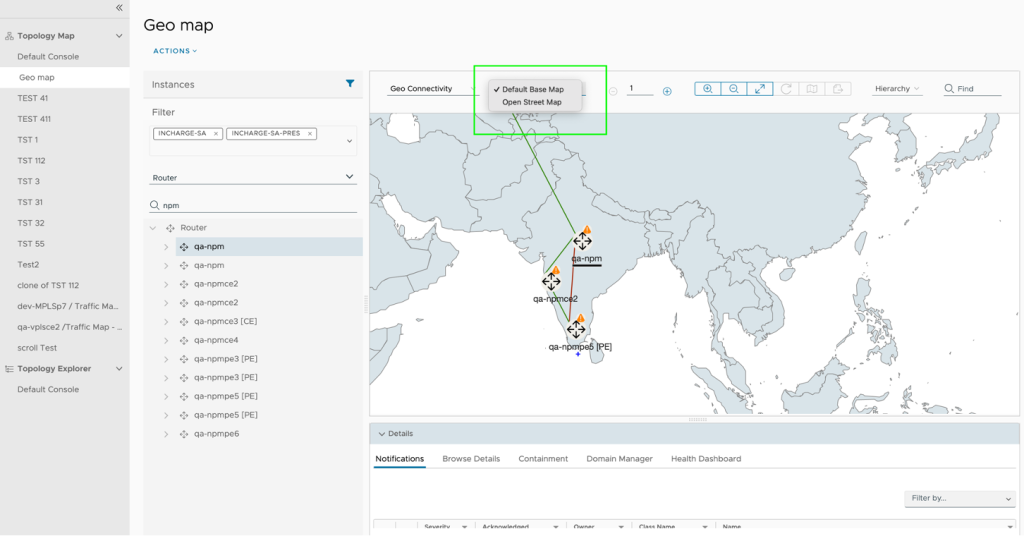
Geo Map Connectivity is currently available only for physical connectivity as one of the available map types. The Geo map connectivity provides Offline and Online Map support. For Geo Map Connectivity, the nodes in the map uses latitude/longitude to get the correct locations in the map.
Traffic Map Views
Traffic Map to show performance metrics of interfaces on graph edges
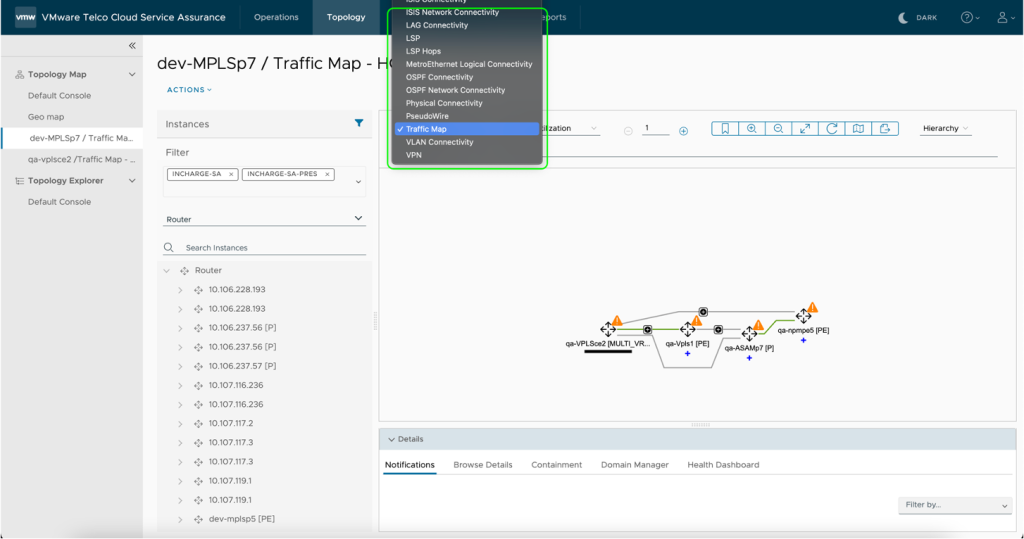
Traffic Maps shows metrics for physical infrastructure Traffic Utilization and Input Packet Error. The default selection is Traffic Utilization.

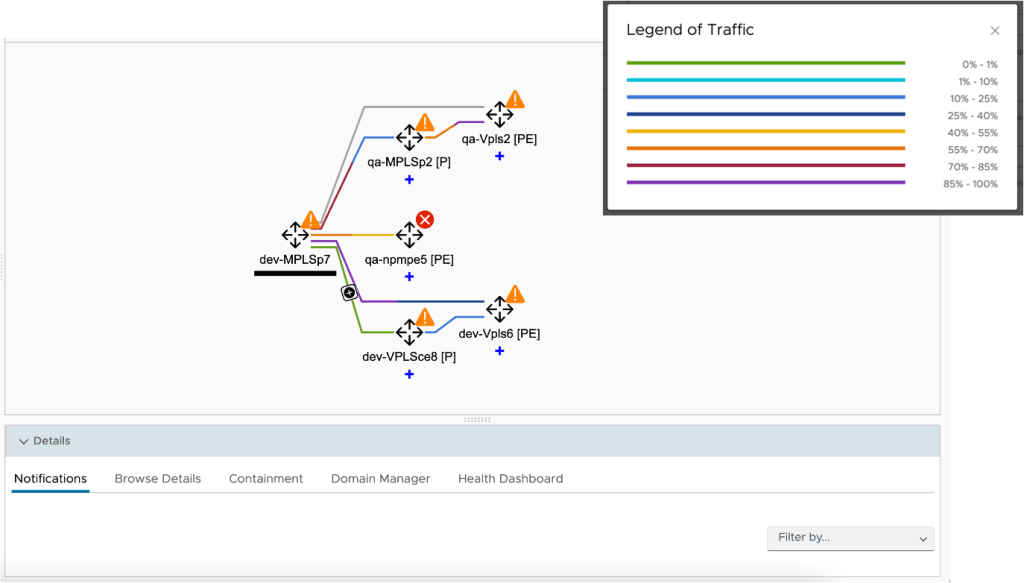
Interoperability support of Telco Cloud Service Assurance with VMware Smart Assurance deployments
VMware Telco Cloud Service Assurance 2.1 release introduces interoperability capabilities with existing VSA deployments including, MnR, Smarts and NCM. TCSA 2.1 interoperability with VMware Smart Assurance (VSA) 10.1.5+ releases.
Using the interoperability feature, allows automatic import of metrics, alarms and automatic topology built by the domain managers. Telco Cloud Service Assurance has inbuilt data catalogs to import data from domain managers. As data is ingested into the database, it will be automatically aggregated (hourly, daily, weekly, monthly). Along with data aggregation, customer can take advantage of the advanced features like automatic anomalies and remediation actions based on filter and thresholds.
Conclusion
VMware Telco Cloud Service Assurance reduces costs and complexity for Network Operations Centers and Service Operations Centers by providing a single pane of glass for fault management, performance management, service management, network slice management, Root Cause Analysis (RCA) and service impact analysis in multi-vendor, multi-cloud environments.
The solution built on a cloud-native architecture is provisioned with data collector framework to support modern network transformation. Besides its built-in Smart data collector, Telco Cloud Service Assurance can collect data from 3rd party monitoring tools, including VMware vRealize Operations for virtual infrastructure and public cloud monitoring.
It enables closed-loop automation and remediation using the standard ETSI NFV-SOL interface for integrating with standard-based orchestrator such as VMware Telco Cloud Automation.
Discover more from VMware Telco Cloud Blog
Subscribe to get the latest posts sent to your email.







